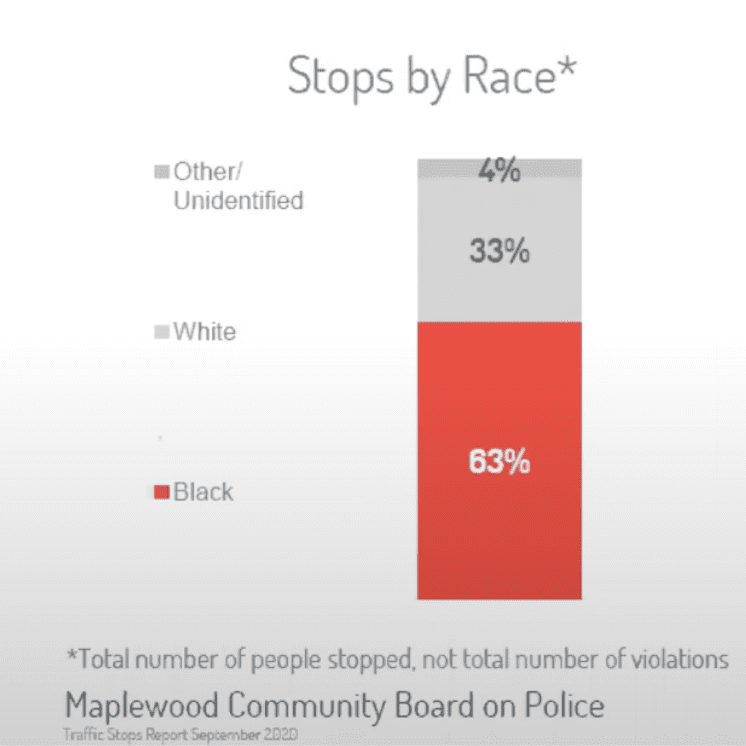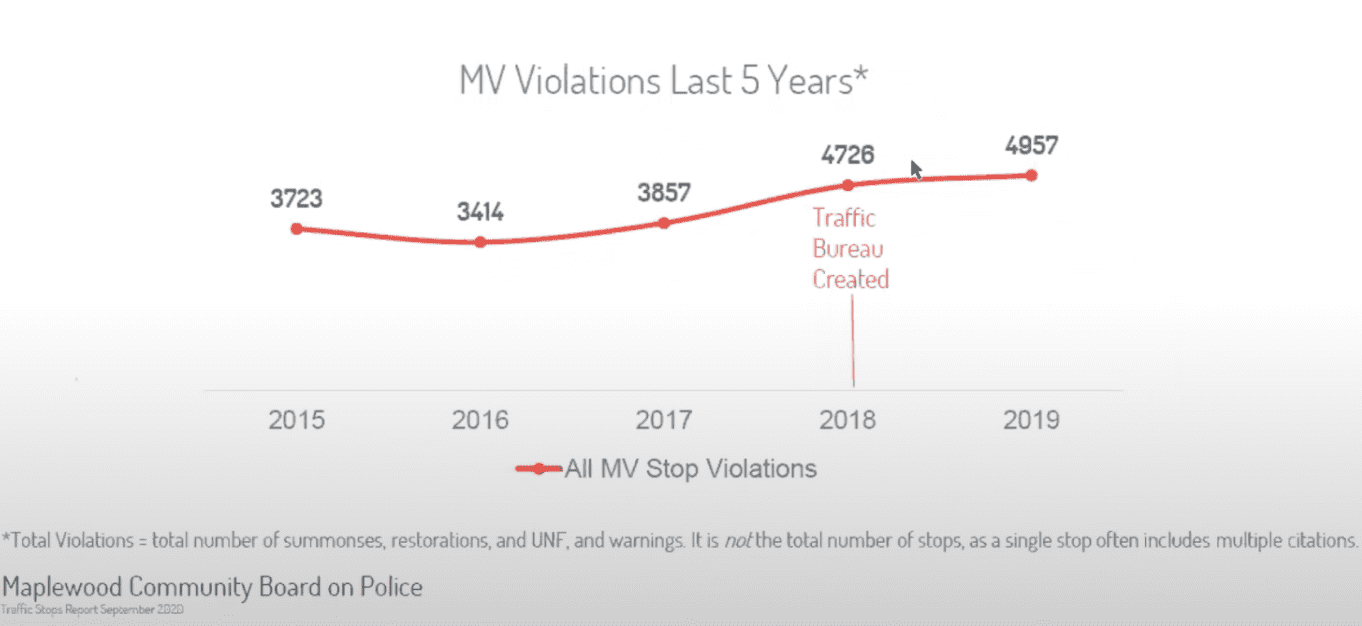The Maplewood Community Board on Police’s September 2 presentation addressed racial inequalities and other concerns discovered in a review of data from the Maplewood Police Department’s Traffic Bureau.
The presentation was part of a monthly special topics series and was hosted by Vice Chair Kasia Piekarz. She analyzed Maplewood Police Department data from 2019 and found that Black drivers are almost twice as likely to be stopped for traffic violations than white drivers. Piekarz believes that this trend can also be seen on a national level.
(see the full presentation below)
“We’ve all read the stories, we have seen the data on a national perspective and so it’s really our responsibility to investigate what’s happening here,” Piekarz said.
Deputy Chief of Police Albert Sally does not believe that race plays a factor in traffic stops in the township. He explained that officers are sent to more populated and diverse areas because that is where most of the traffic concerns are.
“I don’t think it’s race,” Sally said. “I think it’s just more so the population and the traffic we have in those areas.”
Piekarz also found that once drivers are stopped, Black drivers are slightly more likely to receive more than one violation. Black drivers are more than three times as likely to receive a violation for a suspended license or registration and more likely to receive a violation for a broken light.
Chair Erin Scherzer explained that violations for broken lights can hurt lower-income individuals, who may have to choose between paying their ticket and repairing their car or paying their bills. “If somebody’s getting a fine for two hundred dollars, that’s the cost of groceries and an electric bill for some households,” Scherzer said.
Piekarz recommended the institution of an annual or bi-annual “Fix Your Lights” Event for individuals who cannot afford to fix their headlights and other small repairs.

The board also discussed how some traffic stops are purely investigatory. The Maplewood Police Department is not required to report the initial reason for a stop, only the resulting violation. Member Michael Paris argued that officers should be required to record their original reason for a stop as well as the resulting charge.
“We would be cutting edge here if we had a way that the officer would have to tell the dispatcher why the stop is being made when it’s being made and that were recorded,” Paris said. “That would be vital.”
Piekarz said one of the next steps is deeply analyzing the effectiveness of the Traffic Bureau. The Traffic Bureau was created to reduce accidents, enforce violations, and promote traffic safety. Since their establishment in 2018, the bureau increased the amount of tickets per year, but they have not seen a significant decrease in motor vehicle accidents.
In 2018, the year the Traffic Bureau was created, the number of accidents increased. In 2019, there were 724 accidents, which was a decrease from the previous year. However, it is still higher than the amount of accidents in 2015 and 2016, before the Traffic Bureau was created.
“If there is any sort of progress, there’s some sort of time lag because we’re not seeing sort of a commensurate with the increase in tickets and a similar decline in the number of accidents,” Piekarz said.
Member Stephanie Hoeler argued that the racial discrimination seen in the data is only worsened by the increase in tickets.
“I’m certainly not against more summonses or more tickets but when we’re already starting at a place that’s unequal, saying do it more is saying do it more unequally,” Hoeler said.
Piekarz also analyzed speeding complaints and violations from the town. While she found that Black and white people received speeding tickets at similar rates, her analysis uncovered issues with how this data is recorded. She said that speeding and traffic complaints are the most common type of complaint in the township, but dispatchers have been inconsistent in reporting them.
“In investigating this, I think we discovered that the recording of these complaints is not as good as we would like it to be,” Piekarz said.
In 2019, there were 18 speeding complaints recorded by the Maplewood Police Department, but Piekarz said the number was much higher in reality. She recommended better reporting practices for dispatchers and a community survey to help gather more information.
“Aside from putting a complaint in, there’s no real mechanism for people to say, ‘this is what my experience was like,’” Piekarz said.
The board’s next steps include analyzing Latinx drivers, accidents, vehicle searches, speed radar data and revenue generated from violations.
Maplewood Mayor Frank McGehee thanked the board for their work and said he can use the data from this presentation to make reforms. “It’s just really a phenomenal document,” McGehee said. “I want to say that this is data that we can leverage across divisions and departments, there’s no question about it.”
The Maplewood Community Board on Police was created to review police activity and improve the relationship between the police and the community in the township. They currently meet virtually, due to the COVID-19 pandemic, on the first Wednesday of every month at 7:30 p.m. The next meeting will be on October 7 and the link to join the meeting on Webex can be found on the Maplewood Community Board on Police website.

